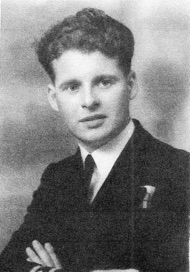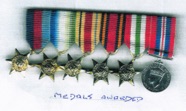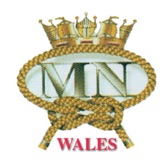First Trip - By Colin Mannings
I was born in Wales, lived with my family in Teeside and undertook my sea training at Ingham Hall Norfolk in the Prince of Wales Sea Training School in 1940 where we watched the Battle of Britain. My total career at sea spanned 11 years and I served in the North Atlantic, South Atlantic, Mediterranean and India.


On my first trip we nearly ran out of coal dodging the Bismarck following RN instruction. The trip ended badly when at 1740hrs on the 29th June 1941 the S.S. Rio Azul was torpedoed and sunk by the German submarine U-123 about 200 miles southeast of the Azores whilst on voyage from Pepel via Freetown to Middlesborough with a cargo of iron ore. She broke in two and sunk within a minute. The Master, 31 crew and one gunner were lost. The survivors, 6 crew and 3 gunners were picked up from rafts by HMS Esperance on the 14th July and taken to Scapa Flow, Orkneys.
The following are extracts from the log of time on the rafts written up on HMS Esperance:
The Rio Azul 4,000 gross tonnage with a cargo of iron ore was torpedoed on June 29th 1941.
The torpedo struck the ship on the port side beneath the bridge smashing to port lifeboat and breaking the ship in two at this level. The bows and stern cocked in the air and she sank within a minute. There was no opportunity of lowering the starboard boat as the falls had gone over the side and there was no slack to pay off. All that was left to do was to jump for it and hope to pick up one of the rafts.
Shortly after the ship sunk a fairly large U-Boat surfaced within 100-300 yards distance. She appeared to be in excellent condition, the paint was new and it was the general opinion that she was fairly recent from the shipyard. Two guns were mounted, one forward and one aft, the size of which was not determined. The officer in charge made it clear that he would attempt to send some assistance and proceeded without leaving any supplies.
By nightfall 18 men had managed to climb onboard the rafts including the 3rd Mate, Senior Radio Officer, Chief Steward, Apprentice, Boatswain, two soldier Gunners, Merchant Navy gunner, three Seamen, Cabin Boy, Galley Boy, two Greasers, a Fireman and a Trimmer. Shouting was heard but no other survivors could be found and rescued. Some who could not be identified hung on to the spars and other pieces of floating timber for a while but had drowned before they could be reached. One of the rafts was badly damaged and one of the supporting drums at one end had come adrift leaving a sloping surface. The other was intact and kept the majority of the other survivors afloat. From amongst the wreckage it was possible to save a tin containing about ten tablespoons-full of molasses, a tin of egg substitute and a tin of cocoa. In addition to this tins of cigarettes and tobacco were salved but there were no matches.
There was one and three quarter gallons of fresh water remaining which was secured on to the rafts. Flares and distress signals had been destroyed at the time the raft was launched.
The water was rationed, the daily allowance being the amount what could be contained in the brass stopper of a paraffin can, representing about three teaspoons-full. The molasses, egg substitute and cocoa was issued on a stick moistened by a little fresh water. One night there was a shower of rain and it was possible to collect a gallon of water by means of a tarpaulin which was spread out. This was all the food and water available for the 18 survivors.
On the fourth day a ship was sighted, probably only a tramp, although only the masts, bridge and funnel were visible. Despite the flashing of cigarette tins in the sun, the idea of the Boatswain, and the waving of a flag on an improvised flagpole, the raft was not seen and the ship proceeded on her way.
The posture on the raft was very cramped, and the only means of stretching the limbs was to bathe. This was done daily by all with the exception of the Chief Steward whose age was 69. Black fish were seen but no sharks. It was found helpful to sprinkle water on each other, and this was done at frequent intervals. Opinion is not unanimous as to the assistance afforded by drinking urine a practice which was regularly employed by some of the survivors, but it was agreed that drinking sea water was definitely harmful. As far as possible attempts were made to conserve energy and we lay as still as possible for long periods. We slept fitfully but our sleep was usually accompanied by some dreams of a fantastic type. Prayers were said daily. There was no undue despondency and for the most part the craving for food and water was not as marked as might have been expected. During the last few days we were over-whelmed by a rapid and progressive weakness and sensibility to the various discomforts became dulled.
It was not until July 11th, the 13th day, that the Radio Officer the first to die, succumbed; he was followed the next day by the Chief Steward. On the 13th there were three deaths. One of the army gunners who had been drinking sea water and his urine, and whose mind became somewhat deranged, went over the side for a swim and was unable through weakness to return to the raft; the Cabin Boy and a Trimmer passed quietly away. In the early hours of the 14th, the Third Mate who had gone crazy, and later it was found that one Sailor had died.
By the time one of the Firemen was brought to the sick bay he also was found to have died. This accounts for eight of the original eighteen survivors on the raft, the remaining ten having been received in the sick bay in various degrees of exhaustion. When asked several of the toughest survivors reckoned that had they not sighted the ship they might have existed for a further three to four days, but disappointment would have been so great if their signals had not been picked up and answered that it seem doubtful whether they could have lasted much longer.
Without a doubt it was the flashing of the tobacco tins which attracted the attention of the look out on the ship that led to their rescue.

Photograph taken from HMS Esperance shows the survivors about to be rescued.
I had to leave the MN following the sinking as I developed Asthma which became worse after spending 15 days in the sea clinging to a raft. After some time in hospital I was given a 100% pension but this was reduced and later stopped, as I had not made myself available for further medical examinations. I had become bored being at home and had gone back to sea. I joined R. Ropner Co. as an apprentice.
I was in Malta in 1943 on S.S. Fort Cadotte when we were informed all ships in harbour had to get to sea as quickly as possible as the Italian fleet was making its way towards Malta. We were in Malta for repairs and the boiler was shut down which in a steamship means it takes hours to get sufficient steam up to move. Fortunately the Italian fleet surrendered before it reached Malta.
Whilst in Bari, again on S.S. Fort Cadotte, on the east coast of Italy, the Sam boat in front of us carrying a cargo of high explosives blew up. This shattered the harbour, which was out of commission for about three days and badly damaged the ship I was on and we had to go into dry dock in Alexandria and so we missed the second front.
Then we were sent to India.
Colin Mannings No. 94
